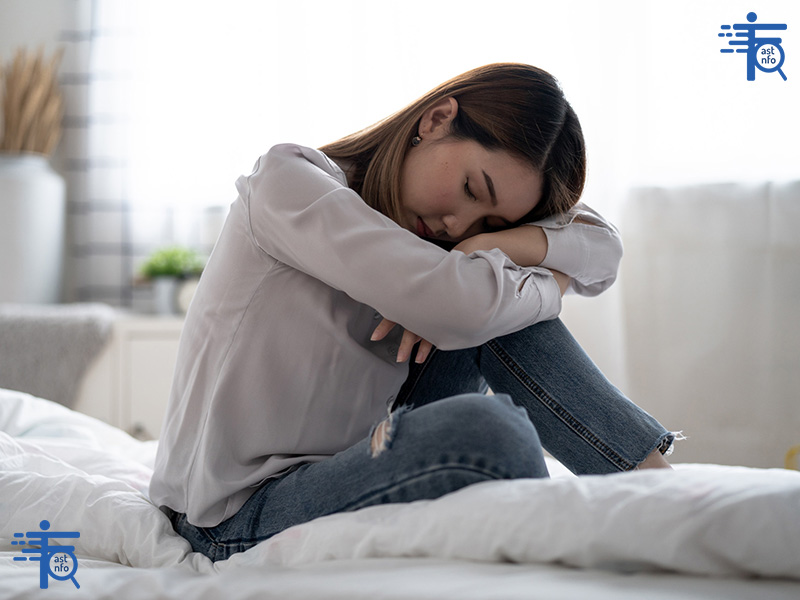What Is the Link Between Anxiety and Insomnia?
The link between anxiety and insomnia is well-established and often bidirectional, meaning that anxiety can lead to insomnia, and insomnia can exacerbate anxiety.

This creates a vicious cycle that can significantly impact mental and physical health. Here’s a detailed look at how the two are connected:
1. Anxiety as a Cause of Insomnia
Anxiety, whether generalized anxiety disorder (GAD), panic disorder, or stress-related anxiety, can make it difficult to fall asleep or stay asleep. Here’s how:
- Racing Thoughts: Anxiety often causes intrusive, repetitive, or worrisome thoughts that keep the mind active, making it hard to relax and fall asleep.
- Hyperarousal: Anxiety triggers the body’s “fight or flight” response, releasing stress hormones like cortisol and adrenaline, which increase alertness and make it difficult to wind down.
- Physical Symptoms: Anxiety can cause physical symptoms like a racing heart, sweating, or muscle tension, which can interfere with sleep.
- Fear of Not Sleeping: The worry about not getting enough sleep (a condition called sleep anxiety) can itself become a source of anxiety, further worsening insomnia.
2. Insomnia as a Cause of Anxiety
On the flip side, chronic insomnia can contribute to the development or worsening of anxiety:
- Sleep Deprivation: Lack of sleep affects the brain’s ability to regulate emotions, making you more susceptible to stress and anxiety.
- Increased Stress Hormones: Poor sleep can elevate cortisol levels, which can heighten feelings of anxiety.
- Cognitive Impairment: Insomnia impairs focus, decision-making, and problem-solving, which can make it harder to manage stressors effectively.
- Negative Thought Patterns: Sleep deprivation can amplify negative thinking and rumination, which are common in anxiety disorders.
3. Shared Underlying Mechanisms
Anxiety and insomnia often share common biological and psychological factors:
- Hyperactive Nervous System: Both conditions are linked to an overactive sympathetic nervous system, which keeps the body in a state of heightened alertness.
- Neurotransmitter Imbalances: Dysregulation of neurotransmitters like serotonin, GABA, and dopamine can contribute to both anxiety and sleep disturbances.
- Genetic Predisposition: Some individuals may have a genetic vulnerability to both anxiety disorders and sleep problems.
- Lifestyle Factors: Poor sleep hygiene, excessive caffeine intake, and lack of physical activity can worsen both anxiety and insomnia.
4. The Vicious Cycle
Anxiety and insomnia often feed into each other, creating a self-perpetuating cycle:
- Anxiety makes it hard to fall or stay asleep.
- Poor sleep increases stress and anxiety levels.
- Increased anxiety further disrupts sleep, and the cycle continues.
This cycle can lead to chronic insomnia and worsening anxiety if not addressed.
5. How to Break the Cycle
Breaking the link between anxiety and insomnia requires addressing both conditions simultaneously. Here are some strategies:
For Anxiety:
- Cognitive Behavioral Therapy (CBT): CBT for anxiety (CBT-A) helps identify and challenge negative thought patterns that contribute to anxiety.
- Relaxation Techniques: Practices like deep breathing, progressive muscle relaxation, or mindfulness meditation can calm the mind and body.
- Medication: In some cases, anti-anxiety medications or antidepressants may be prescribed by a healthcare provider.
- Lifestyle Changes: Regular exercise, a balanced diet, and reducing caffeine or alcohol intake can help manage anxiety.
For Insomnia:
- Cognitive Behavioral Therapy for Insomnia (CBT-I): This is the gold standard for treating insomnia and focuses on changing behaviors and thoughts that disrupt sleep.
- Sleep Hygiene: Establish a consistent sleep schedule, create a relaxing bedtime routine, and optimize your sleep environment.
- Limit Stimulants: Avoid caffeine, nicotine, and screens close to bedtime.
- Relaxation Before Bed: Engage in calming activities like reading, listening to soothing music, or taking a warm bath.
Combined Approaches:
- Mindfulness-Based Stress Reduction (MBSR): Combines mindfulness meditation and yoga to reduce stress and improve sleep.
- Exercise: Regular physical activity can reduce anxiety and improve sleep quality.
- Professional Help: If anxiety and insomnia persist, consult a healthcare provider or sleep specialist for personalized treatment.
6. When to Seek Help
If anxiety and insomnia are significantly impacting your daily life, it’s important to seek professional help. Chronic sleep problems and untreated anxiety can lead to more serious health issues, including depression, cardiovascular problems, and weakened immune function.
Final Thoughts
The link between anxiety and insomnia is complex and deeply interconnected. By addressing both conditions through lifestyle changes, therapy, and, if necessary, medical intervention, you can break the cycle and improve both your mental health and sleep quality. Remember, you don’t have to face these challenges alone—help is available.

If you’re wondering whether you have insomnia, it’s important to understand the symptoms, causes, and diagnostic criteria. Insomnia is a common sleep disorder characterized by difficulty falling asleep, staying asleep, or waking up too early and not being able to go back to sleep, despite having the opportunity to sleep. Here’s a guide to help you determine if you might have insomnia and what steps to take next:
Common Symptoms of Insomnia
- Difficulty Falling Asleep: Taking more than 20-30 minutes to fall asleep most nights.
- Trouble Staying Asleep: Waking up frequently during the night and having trouble returning to sleep.
- Waking Up Too Early: Waking up earlier than desired and being unable to fall back asleep.
- Non-Restorative Sleep: Feeling unrefreshed or tired even after a full night’s sleep.
- Daytime Impairments: Experiencing fatigue, irritability, difficulty concentrating, or mood disturbances during the day.
- Worry About Sleep: Feeling anxious or preoccupied with your inability to sleep well.
Types of Insomnia
- Acute Insomnia:
- Short-term, often lasting a few days or weeks.
- Usually triggered by stress, life changes, or temporary disruptions.
- Chronic Insomnia:
- Occurs at least three nights per week for three months or longer.
- Often linked to underlying physical or mental health conditions, poor sleep habits, or lifestyle factors.
Causes of Insomnia
Insomnia can be caused by a variety of factors, including:
- Stress: Work, school, relationships, or financial worries.
- Mental Health Disorders: Anxiety, depression, PTSD, or bipolar disorder.
- Medical Conditions: Chronic pain, asthma, acid reflux, or hormonal imbalances.
- Lifestyle Factors: Irregular sleep schedule, excessive caffeine or alcohol use, or screen time before bed.
- Environmental Factors: Noise, light, or an uncomfortable sleep environment.
- Medications: Certain medications can interfere with sleep.
Do You Have Insomnia? Ask Yourself These Questions
- Do you have trouble falling asleep, staying asleep, or waking up too early most nights?
- Do you feel tired, irritable, or unfocused during the day?
- Have your sleep difficulties lasted for more than a month?
- Are your sleep problems affecting your daily life, work, or relationships?
- Have you ruled out other potential causes, such as poor sleep habits or environmental factors?
If you answered yes to most of these questions, you may have insomnia.

What to Do Next
If you suspect you have insomnia, here are some steps you can take:
1. Track Your Sleep
- Keep a sleep diary for 1-2 weeks, noting:
- Bedtime and wake-up time.
- How long it takes to fall asleep.
- Number of awakenings during the night.
- How you feel in the morning and throughout the day.
- This can help identify patterns and provide useful information for a healthcare provider.
2. Improve Sleep Hygiene
- Stick to a Schedule: Go to bed and wake up at the same time every day.
- Create a Relaxing Routine: Wind down with calming activities like reading or taking a warm bath.
- Optimize Your Sleep Environment: Make your bedroom cool, dark, and quiet.
- Limit Stimulants: Avoid caffeine, nicotine, and screens before bed.
- Exercise Regularly: Physical activity can improve sleep quality, but avoid vigorous exercise close to bedtime.
3. Manage Stress and Anxiety
- Practice relaxation techniques like deep breathing, meditation, or progressive muscle relaxation.
- Consider therapy, such as Cognitive Behavioral Therapy (CBT), to address underlying stress or anxiety.
4. Consult a Healthcare Provider
If your insomnia persists despite making lifestyle changes, it’s important to seek professional help. A doctor or sleep specialist can:
- Rule out underlying medical or mental health conditions.
- Recommend treatments such as Cognitive Behavioral Therapy for Insomnia (CBT-I), which is highly effective for chronic insomnia.
- Prescribe medication if necessary (usually as a short-term solution).
When to Seek Immediate Help
Consult a healthcare provider right away if:
- Your insomnia is accompanied by severe mood changes, such as depression or suicidal thoughts.
- You experience symptoms like loud snoring, gasping for air, or excessive daytime sleepiness, which could indicate sleep apnea.
- Your insomnia is significantly impacting your daily functioning or quality of life.
Final Thoughts
Insomnia is a treatable condition, and you don’t have to suffer in silence. By identifying the symptoms, improving sleep habits, and seeking professional help when needed, you can take steps toward better sleep and improved overall well-being. If you suspect you have insomnia, don’t hesitate to reach out to a healthcare provider for guidance and support.

Treating insomnia
Treating insomnia often requires a combination of lifestyle changes, behavioral strategies, and, in some cases, medical interventions. The goal is to address the underlying causes of insomnia and improve sleep quality. Here’s a comprehensive guide to treating insomnia effectively:
1. Cognitive Behavioral Therapy for Insomnia (CBT-I)
CBT-I is the gold standard for treating chronic insomnia and is highly effective. It involves working with a therapist to change thoughts and behaviors that contribute to sleep problems. Key components include:
- Sleep Restriction: Limiting time in bed to match actual sleep time, then gradually increasing it as sleep improves.
- Stimulus Control: Associating the bed only with sleep and sex (e.g., no TV, work, or eating in bed).
- Cognitive Restructuring: Challenging and changing negative thoughts about sleep.
- Relaxation Techniques: Practicing methods like deep breathing, progressive muscle relaxation, or mindfulness to reduce anxiety.
- Sleep Hygiene Education: Learning habits that promote better sleep.
2. Improve Sleep Hygiene
Adopting healthy sleep habits can significantly improve sleep quality. Here’s how:
- Stick to a Schedule: Go to bed and wake up at the same time every day, even on weekends.
- Create a Relaxing Bedtime Routine: Wind down with calming activities like reading, taking a warm bath, or listening to soothing music.
- Optimize Your Sleep Environment:
- Keep your bedroom cool, dark, and quiet.
- Invest in a comfortable mattress and pillows.
- Use blackout curtains or a white noise machine if needed.
- Limit Stimulants: Avoid caffeine, nicotine, and alcohol close to bedtime.
- Avoid Screens: Turn off phones, tablets, and TVs at least an hour before bed to reduce blue light exposure.
- Exercise Regularly: Engage in physical activity during the day, but avoid vigorous exercise close to bedtime.
3. Relaxation Techniques
Stress and anxiety are common contributors to insomnia. Relaxation techniques can help calm the mind and body:
- Deep Breathing: Practice slow, deep breaths to reduce tension.
- Progressive Muscle Relaxation (PMR): Tense and relax each muscle group in your body to release physical stress.
- Mindfulness Meditation: Focus on the present moment to quiet racing thoughts.
- Guided Imagery: Visualize calming scenes or experiences to promote relaxation.
4. Address Underlying Causes
Insomnia is often a symptom of other issues. Addressing these can improve sleep:
- Mental Health Conditions: Treat anxiety, depression, or PTSD with therapy (e.g., CBT) or medication.
- Medical Conditions: Manage chronic pain, acid reflux, sleep apnea, or other health issues with the help of a doctor.
- Medications: Some medications can interfere with sleep. Talk to your doctor about alternatives if needed.
5. Sleep Medications
Medications should be used as a short-term solution and under the guidance of a healthcare provider. Common options include:
- Prescription Sleep Aids: Such as zolpidem (Ambien), eszopiclone (Lunesta), or trazodone.
- Melatonin Receptor Agonists: Like ramelteon (Rozerem), which regulate the sleep-wake cycle.
- Over-the-Counter Sleep Aids: Such as antihistamines (e.g., diphenhydramine), but these can cause grogginess and are not recommended for long-term use.
6. Natural Remedies
Some people find relief with natural remedies, though evidence varies:
- Melatonin Supplements: May help regulate sleep-wake cycles, especially for jet lag or shift work.
- Herbal Teas: Chamomile, valerian root, or lavender tea can promote relaxation.
- Aromatherapy: Essential oils like lavender or bergamot may help create a calming environment.
7. Lifestyle Adjustments
Small changes in daily habits can make a big difference:
- Limit Naps: Avoid napping during the day, or limit naps to 20-30 minutes.
- Avoid Heavy Meals Before Bed: Eat dinner at least 2-3 hours before bedtime.
- Stay Active: Regular physical activity can improve sleep quality, but avoid intense workouts close to bedtime.
- Manage Stress: Practice stress-reducing techniques like journaling, yoga, or talking to a therapist.
8. When to Seek Professional Help
If insomnia persists despite self-help strategies, consult a healthcare provider or sleep specialist. They can:
- Diagnose underlying conditions (e.g., sleep apnea, restless legs syndrome).
- Recommend specialized treatments like CBT-I.
- Prescribe medications if necessary.
9. Be Patient and Persistent
Improving sleep takes time and consistency. Stick to your treatment plan, even if progress is slow. Celebrate small victories, like falling asleep a few minutes faster or waking up less often during the night.
Final Thoughts
Insomnia is a treatable condition, and there are many effective strategies to help you regain restful sleep. By combining behavioral changes, relaxation techniques, and professional guidance, you can break the cycle of insomnia and improve your overall well-being. If you’re struggling, don’t hesitate to reach out for help—better sleep is within reach!








No comment